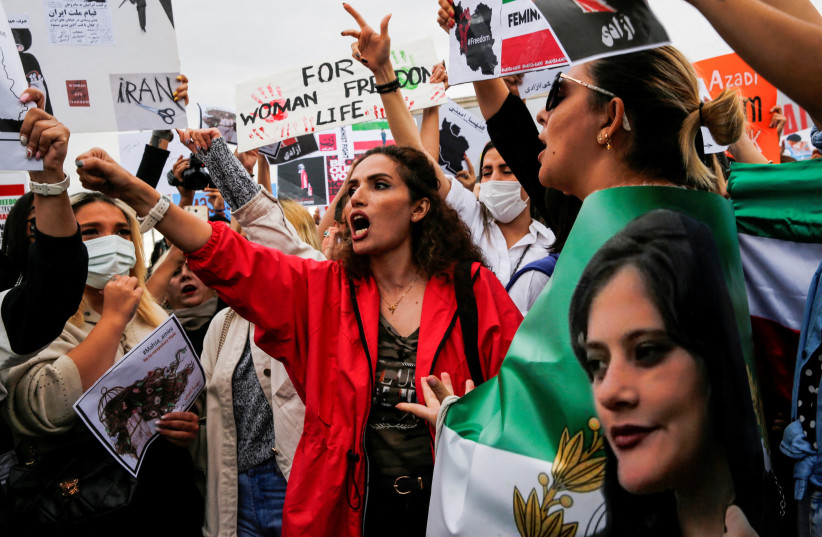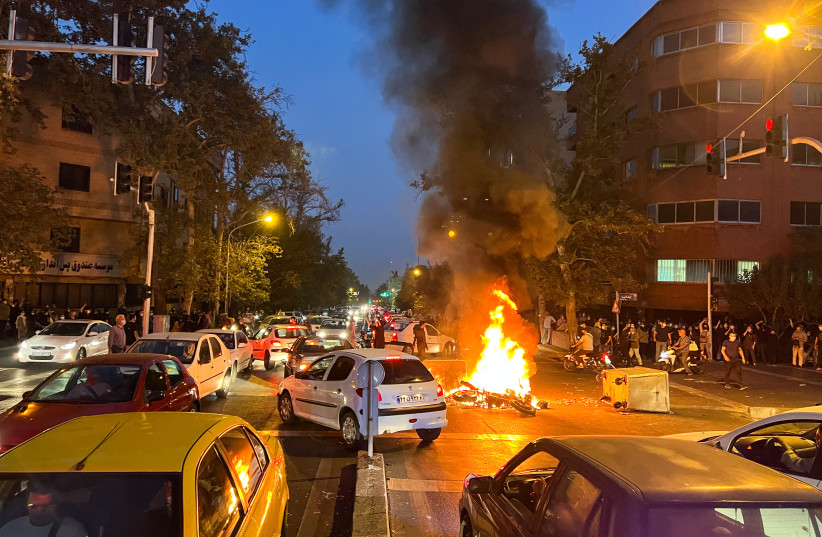In its fifth week, Iran’s tentative bid for freedom has found its voice in the song “Baraye.”
Dubbed the anthem of the Iranian revolution, its words encapsulate a nation’s longing for freedom and a people’s desperate cry against a regime that has been as brutal as it has been unforgiving. Both a moving tribute and a testimony to the horrors Iranians have had to endure under the diktat of the “Governance of the Jurist,” “Baraye” is an ode to Iran’s lost decades, a plight for freedom and liberty.
“For the unstoppable tears
For students and their future
For this forced heaven

For the imprisoned elite students
For the Afghan kids
For all of these meaningless slogans
For the sun after these long nights
For men, fatherland, prosperity
For the girl who wished to be a boy
For women, life, freedom
For freedom”
Its author, Shervin Hajipour, was in Iran’s most infamous prison, Evin. His last words to his family were that the regime’s men had broken his legs. Although officials initially promised that he would be released on bail, Tehran instead chose to make an example of him. It is because “Baraye” echoes a truth that has now exploded onto our screens – that the regime will show no mercy. One is not allowed freedom of thought in the Islamic Republic, never mind the audacity of criticism against the proclaimed sanctity of the regime.
Accused of collaborating with foreign powers, Shervin Hajipour faces the death penalty. (Hajipour was eventually released on bail in early October.)
What is there left to say of a regime that so eagerly rejects the sanctity of human life, and for which mere words constitute a crime punishable by death?
Does the Islamic Regime care about human life at all?
“Baraye” is absolutely and unequivocally central to Iran’s budding revolution. It transcribes the reality of Iranians’ hopes and hopelessness with faultless accuracy. Today its words have become inescapable.
For four decades, Iran has lived under bloated skies, its very air polluted by the excesses of a regime that has squandered a nation’s riches and resources so that its supporters could be rewarded while others have lingered in abject poverty. There are no crimes the regime has not committed, no lines it hasn’t crossed to assert its dominion.
Faced with impossible odds, Iranians are simply refusing to give up – and women are leading.
More than most, women have suffered the assaults of the regime. Forced to abide by the regime’s ascetic morality code, robbed of all choices; their dress code, and most particularly the headscarf (hijab), has been strictly mandated – failure to comply has translated into brutal beatings and in the case of Mahsa Amini, death.
If young Mahsa Amini is today the face of a movement, she is but one among many to have died by the hands of Iran’s security apparatus.

It is most certainly because the regime has directed its ire toward women who thousands today have chosen to rebel, and in doing so risk their lives. Freedom, it is often said, has a cost! How many Iranians will have to pay the ultimate price before they are granted the courtesy of theirs?
Protests are nationwide
The images of defiant schoolgirls, no older than 15, are haunting. Their courage – is remarkable, as they take down the symbols of the regime from their classroom walls to replace them with the words: “women, life, freedom.”
Thousands have taken to the streets of their cities and villages, and countless have already paid with their lives, too many by all accounts.
Over a thousand intellectuals, celebrities and influencers have already been imprisoned for lending their fame and social media platforms to Iran’s freedom movement.
In Zahedan, in the southeastern province of Baluchistan, the price for rebellion was steep – more than 60 dead, including children, and 300 injured, all unarmed civilians.
As millions across the globe have rallied in support of Iranians’ bid for regime change, we ought to ask what role Western capitals will choose to play – that is, beyond statements of solidarity and grand condemnations of violence.
Revolutions are seldom won on courage alone. There are logistics to such noble endeavors that cannot be escaped. And though it is unlikely foreign powers will enter the fray – past experiences have proven too costly; we may want to consider what our reluctance to intervene, whichever way, may translate into.
Doing nothing as it were, could be in and of itself, an act of violence – especially if we consider that more than 80 million people stand in the regime’s line of fire.
There are risks to our apathy – which may prove far worse than holding the Islamic Republic accountable for its heinous human rights violations. If we could cast Russia out, why not extend the logic to Iran? Tehran committed worse abuses and for far longer – its sponsorship of terrorism worldwide, notwithstanding its furnishing of terror outfits across the MENA region cannot so easily be discounted.
What if the regime was to fall tomorrow? If we have learned anything from the Arab Spring movement (2011) it is that regimes do fall, and when they do, they do not do so quietly. Regime change is a messy business.
So what if the regime was to fall tomorrow? What of its security apparatus and its ideology? Since it is unlikely all the regime’s men will be arrested or even killed in the violence, then we must consider what escape routes they may engage on, and more pertinently, whether or not they may attempt to make a home abroad, under more auspicious skies so that their ideology could survive.
And if high-ranking commanders of the Ba’ath Party in Iraq could reinvent themselves as agents of ISIS, then what is to stop the Iranian regime from exporting its Islamism to other shores?
With an axis of resistance stretching across several Arab capitals – Beirut, Damascus, Baghdad and Sanaa, the ayatollahs are not without friends. It is likely the regime’s men will look upon Yemen with utmost interest and recognize in Yemen’s geography the opportunities Iran never could offer by way of geographical access.
At a crossroads between Africa, Asia and, of course, the Middle East, Yemen also sits on the world oil route – an advantage that will not escape a regime on the run. And since the regime in Iran and the Houthis of Yemen enjoy a friendship, a friendship subsidized by large cash injections, a transfer may not be much of a stretch – in any case, we ought to consider such a possibility and its implications.
Let’s remember that Iran’s regime carries an ideology that is not tethered to nationalism or territorial boundaries – its ambitions are to rule over first the Islamic world and second the world as a whole. The place from which it operates matters little. Iran was a convenient vehicle for Ayatollah Ruhollah Khomeini’s vision, but never its end game. Which is exactly why the Islamic Republic cannot be contained.
I fear that in our haste to translate Iran’s regime into digestible media sound bites, we may have completely misunderstood the regime’s goal and the narrative underwriting its ideology. The Islamic Republic is at its essence geared toward ideological imperialism, it cannot and will not be limited to its borders. Its tenets demand more land and more communities to its rule – until there are no more to conquer.
In such a pursuit, it has employed and developed a tight network of agencies, many of which have made homes in our homes, at the heart of our democracies, threatening our national security, our values and our traditions.
IRGC employs a force of 10,000 men it dispatches to our capitals to protect and project Iran’s programs of indoctrination. This force is sustained and supplemented by countless agencies, each dedicated to the propagation of Iran’s Islamic revolutionary model.
Whether or not we care to admit it, Iranians are fighting not only for their freedom but our own.
The writer is a research fellow at the Henry Jackson Society.
